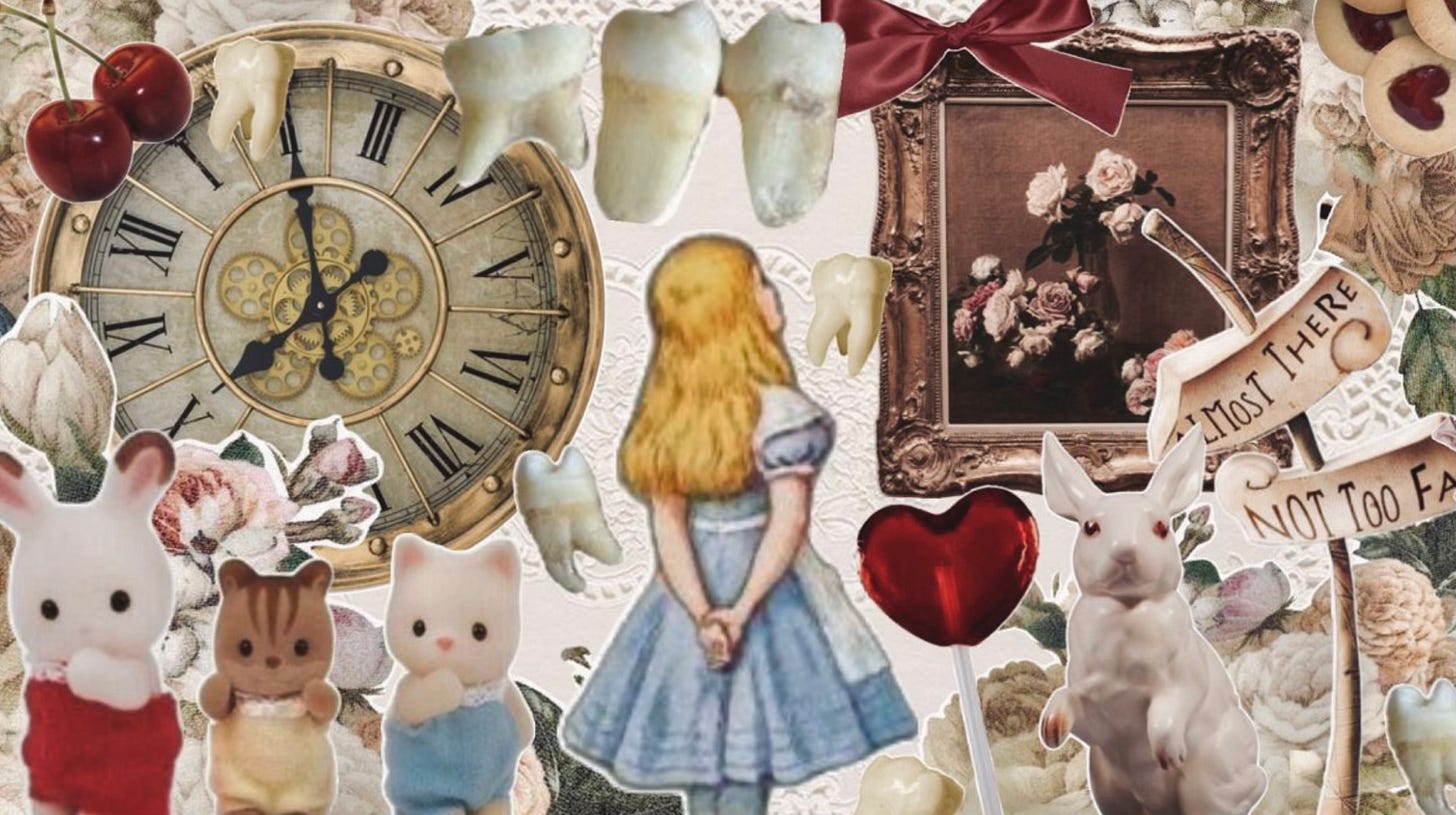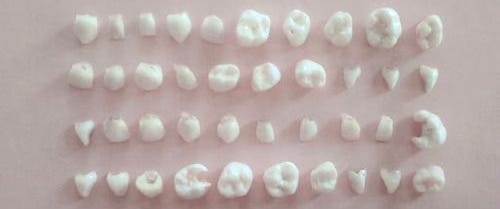I Miss the Bloody Tooth Hole
A brief history of how I mistook pain for progress and absence for spiritual depth—and was mostly right
It always started with the wobble. That faint, delicious wrongness. The looseness that wasn’t supposed to be there. A quiet betrayal. The little click when you pushed your tongue against it just right, like a secret hinge inside your mouth. It wasn’t pain, not exactly. More like potential. A doorway your body was about to open, whether you liked it or not.
I remember clocking it mid-math class once and spending the rest of the lesson in a sort of holy trance, nudging it back and forth like I was tuning a radio only I could hear. I didn’t learn long division that day. I learned that decay has a rhythm, and mine was catchy. There’s something addictive about the first sign that something’s about to fall apart. Not in a romantic way. Not even in a dramatic way. Just in that bored-girl, mildly possessed way. You feel it coming, and you don’t stop it.
You wouldn’t stop it.
I never waited. Patience wasn’t part of the ritual. If something was loose, it meant it wanted to leave. I was just helping it along. I’d sit there—quiet, focused—twisting it gently, obsessively, like I was winding a music box made of bone. Sometimes my fingers did the work. Sometimes my tongue. It wasn’t elegant, but it got the job done.
It didn’t feel brave. It felt procedural. I wasn’t overcoming anything. I was just removing a part of myself like lint. It was already halfway gone. I just made it official. The pull always felt inevitable. Like when you peel off nail polish in one perfect sheet or scratch the same patch of sunburn until it stings just enough to feel honest. Not rebellion. Not performance. Just… maintenance.
You’re not thinking. You’re just following the rhythm. And then it’s out. Quiet snap. Tiny sting. Blood like a secret. And then the hole.
Raw. Pink. Glimmering. A tiny cathedral made of nothing—blood, spit, and the ghost of what used to be there. I’d press my tongue into it like I was trying to keep it open. Like the absence might seal up if I stopped watching. Like I could trace the outline of what I’d lost. It stung. I liked that.
A shift. A signal. Proof that I was different now, even if the difference was stupid and wet and only noticeable to me. The tongue always goes back. Like it’s checking. Like it needs to feel the absence to believe it’s real.
It’s not about nostalgia. Not really. I don’t miss childhood. I miss the trance. The hush after the rip. That suspended stillness when the body pauses, not from peace, but from reconfiguration. There’s a weird kind of euphoria that happens in those seconds. Not joy. Just silence. Your mouth warms. The air tilts. Time flickers. You don’t think about the tooth. You don’t think about yourself. You just hover. It’s meditative, in a deranged sort of way. The only thing anchoring you is the taste of iron and the low throb that says: you’re here now. Something’s happened. The moment split. You crossed into a new version of yourself, and the toll was one useless piece of enamel.
It’s like when the power goes out and the world hums wrong for a second. Then it settles. And you sit in the dark, trying not to move in case it notices.
Metallic. Warm. A little like sucking on a coin. Not disgusting. Not delicious. Just… there. An ambient flavour, like fairy toothpaste or pool water. The taste of being alive, with minor complications.
It was background noise for most of my childhood. I’d bite the inside of my cheek on the bus, during class, while reading. Half on purpose, half just to check that I still existed. Sometimes I did it while talking to someone. No drama. No expression. Just a private ritual, like tapping a pencil or picking at a thread. No one noticed. Why would they?
It wasn’t that I liked the blood. I liked what it meant. Something had broken through. A signal. Proof that my body wasn’t seamless. That something could rupture, and I wouldn’t fall apart.
I’d sit at the dinner table with a swollen gum and a piece of tissue in my pocket like a holy object. Everyone else was talking. Forks clinking. Napkins folding. Normal things. I was half-floating above it all, watching from somewhere just behind my own eyes. Not out of angst. Just distance. I had a job to do. My tongue circled the wound like a priest tending a candle.
It made me feel contained. Private. Like I knew something they didn’t. Like I had a ritual, and they just had soup. No one noticed. Or if they did, they thought I was quiet. Polite. Good. I wasn’t any of those things. I was reverent. Which is different.
There was something spiritual about it. Not in a church way. In a bored-and-unsupervised way. The kind of faith that forms when no one teaches you what to believe, so you start worshipping whatever hurts just enough to feel real. I observed. I waited for things to fall out of me and treated them like omens. Every gap felt like a sign. Every ache, a little sermon. If my body bled, I assumed it had its reasons.
That was the first religion. Not God. Just absence. Just the blood-soaked proof that something had changed.
Sometimes the tooth wasn’t ready. You’d twist and twist, and nothing would happen. Just that dull resistance. That disappointing sturdiness. But you kept going anyway. Not out of cruelty—just because it felt like something was supposed to happen. Like the body had cued a scene and forgot to hit play. You could feel it waiting under the skin like static. The failure to detach didn’t stop the ritual. If anything, it made it holier. You had to earn the absence.
That was the faith of it. The compulsive expectation. The sense that something was coming, and your only job was to keep turning the wheel until it did. Eventually, it would loosen. Or it wouldn’t. But the waiting was part of the trance.
We forget how much waiting there is in childhood. Not the sweet, illustrated kind—no daisy chains or bedtime clocks. I mean the real kind. The obsessive kind. The kind where your body becomes the thing you watch. Waiting for the ache to begin. For the skin to split. For the nail to fall off. For the scab to crust. For the blood to stop. For something to fall out and make you new.
That’s the logic you grow up with. Pain means progress. A wound means something’s working. You only change if something first comes loose.
It’s not dramatic when you’re a kid. It’s just obvious.
Transformation needs proof. And sometimes that proof is a gap in your mouth that tastes like metal and makes you feel important.
Sometimes I miss that.










Oh, this is amazing. You've captured a feeling I'd forgotten so flawlessly.
just started reading and the first line hooked and reeled me in :)